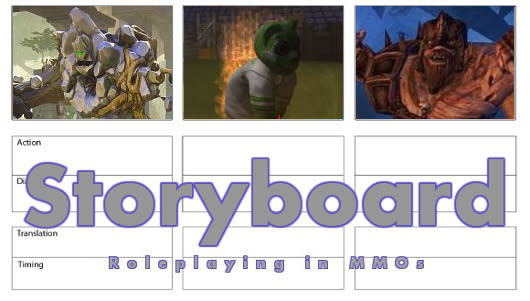Storyboard: Using the fourth wall for good
I don't remember much of the poetry course I took in college whilst pursuing my (ultimately useless) English degree, but I do remember my professor quite vividly. The first day of the class he stood up in front of the room and wrote a line from renowned poet Theodor Geisel: "It's fun to have fun, but you have to know how."
In his case, he was leading into a discussion of the rules of rhyming schemes and such, but he also admitted that the lesson is applicable to a lot of other things. Case in point: using the fourth wall in roleplaying.
MMOs lean on the fourth wall all the time, some more or less than others. But roleplaying generally steers clear of it because leaning on it too heavily can really screw with the overall roleplaying atmosphere. So let's talk a little bit about what the fourth wall is and how you can use it with care to enhance roleplaying rather than damage it.

Numbering walls
It's possible you've heard the term "the fourth wall" without understanding what it's actually referring to. The term originated from theater sets that were built to mimic a room. Obviously, when watching a play, you know that the characters are seated in a room. You also know that there's a wall missing because otherwise the actors would just be reading lines in a box without your being able to see what's going on.
That's the fourth wall. It's the barrier between you and the play. Or the show or the game or the book or whatever. It's the implied understanding that there's a boundary between the real world and the media in front of you.
Playing with the fourth wall is all about pushing that angle a little bit. The most obvious and tedious joke is having characters in a game mention the possibility that their actions are controlled by unseen individuals, something that requires some real cleverness to work as a joke without being instantly boring. Any time a character in a game explicitly tells you the controls, he's breaking the fourth wall for a necessary purpose.
Roleplaying, by necessity, is based on an implied fourth wall. As a player, you're entirely aware of the fourth wall, since you're intentionally suppressing it by stepping into character. You're creating a layer of separation, making sure that the character you play is not the same as the person you are. You need the fourth wall in place.
Except when you don't.

Leaning on the fourth wall
There are two ways to handle the fourth wall, and one of them does the same essential thing that an advancing game plot does: It helps you fill in details that aren't crucial to the story but still make the whole setting feel more alive.
For example, let's look at Star Wars: The Old Republic. What do people do for fun in a galaxy far, far away? Sit in cantinas listening to the same three or four songs over and over, occasionally watching a twi'lek dance? Maybe play a few hands of one card game? This is the sort of variety that would bore a small rural town in the real-world, much less an entire galaxy full of people with wildly different views on what is and isn't fun.
But you also don't have time to carefully review every potential leisure-time activity and quite possibly create a few completely new ones from scratch. So a far better option is to just yank something from the real world, file off the rough bits, and pass it off as a detail from the actual setting. No, it won't stand up to close scrutiny, but that's not the point.
At one point my Jedi Knight was talking with a friend about reading what were essentially old adventure serials as a child. No, there's no real precedent for it, but it's hard to imagine a world where there aren't cheesy adventure franchises for kids. (Especially when you have real-life adventures for "inspiration.") I've taken the broad strokes from current pop music to use as popular songs because while it might be Huttese instead of English, it makes perfect sense that a galaxy far, far away would have its equivalent of Lady Gaga.
None of these details is something that should have huge plots hung from it, but each enriches the setting by adding a little bit of detail that otherwise wouldn't exist. So while you can argue that Azeroth likely doesn't have much in the way of board games, your World of Warcraft Hunter can still indulge in a few hands of a thinly veiled version of Catan.
Letting real life write the plot
So you've had a terrible day, due in no small part to a long-running argument at work with your co-worker. When you log in, the first thought on your mind is that it would be great to just completely forget about real life for a while, to put your horrid day out of your mind. And if that's what's best for you, I completely support that.
But you're also letting yourself pass up an opportunity because not only do you have a plot offering itself to you, but you've already got the emotions to portray it believably. Instead of logging on and throwing everything to one side, log on to The Secret World and explain that your Templar is getting on poorly with some of the other (NPC) people he has to work with. Or jump into Lord of the Rings Online and vent your elf's frustration at dealing with non-elven races who just don't understand how you operate.
There's an element of danger here; you might just find yourself extending your bad mood through the game. But at the best times you can do the fictional situation to work through the real one, examine it a bit more calmly, and feel as if it's been resolved even when it hasn't changed much in the real world.
It doesn't just have to be negative emotions, either. If you're really happy, work with that. Let your character be happy. When you're already feeling something, you can deliver a real sense of verisimilitude to what you're doing, even though you don't want to make your own troubles a constant source of plots for your character. Just every so often you can let it seep in, here and there, gently.
As always, feedback is welcome in the comments below or via mail to eliot@massively.com. Next week, it's time to talk about when you need to just get someone out of your roleplaying life. The week after that, it's time to talk about pacing and numbers in an event.

Every Friday, Eliot Lefebvre fills a column up with excellent advice on investing money, writing award-winning novels, and being elected to public office. Then he removes all of that, and you're left with Storyboard, which focuses on roleplaying in MMOs. It won't help you get elected, but it will help you pretend you did. If you need a refresher, check out the Storyboard Library.


